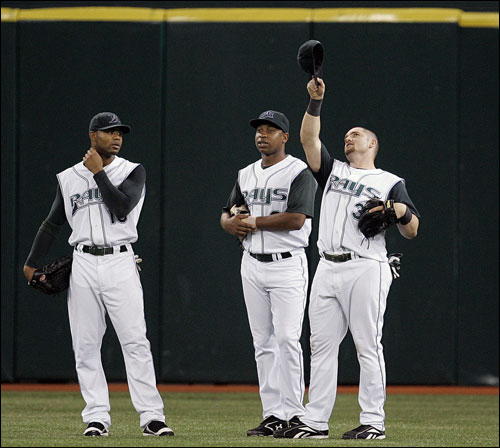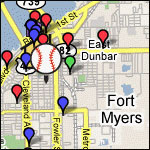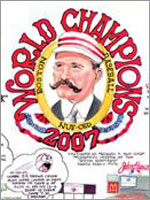Where, Oh Where, Are Those Devil Dogs?
|

|
|
(AP Photo) |
It’s already July. We’re looking at the All-Star Break in just over a week. Interleague play is history, as are the first 81 games of the season. Major League Baseball’s schedulers have pitted the Red Sox against the Yankees a dozen times and have only seven remaining dates to sprinkle over the next three months. Yet, not a single pitch has been thrown to -- much less at -- a Tampa Bay Devil Ray.
Of baseball’s 61 intra-divisional matchups, only Boston and Tampa Bay have yet to play a series this season. Not that anyone should complain. The Devil Rays may well be the least compelling gate on the Boston sports scene. They’re even a rung below the Milwaukee Bucks, who made a valiant effort to outmaneuver the Celtics for the NBA’s second-worst record during their last trip to TD Banknorth Garden in April. At least the Bucks come to town only twice a year, and the few extra ping-pong balls always at stake are better theater than watching Boston batters hypnotized by Casey Fossum’s fastballs. Not to mention, the ping-pong balls move a lot faster.
As puzzling as our wait for this reunion of old AL East friends may seem, you can imagine how it is to a former schedule maker.
“It’s not unprecedented to have a first [divisional] series show up in June sometime,” acknowledges Henry Stephenson, who, along with wife Holly drew up Major League Baseball’s schedules from their Martha’s Vineyard home for 24 seasons before losing their jobs in 2005. “So it will be July. That’s a little late.”
With the Red Sox and Yankees playing 18 and 14 games, respectively, against Tampa Bay from here out, Stephenson’s successors have given the last-place Rays a magnified prominence in the American League East race on par with New Hampshire’s role in deciding the Democratic nomination.
“As far as we were concerned,” the displaced Stephenson recalls, “the objective was to keep it as smoothly distributed across the board as possible because you can never really anticipate what matchup is going to make a difference. When they don’t come out smoothly, people notice.”
Of course, Major League Baseball must cater to a variety of external considerations that make such a smooth distribution impossible.
“There are special requests that teams make, so we’ll start pushing series around a bit,” explains Katy Feeney, MLB’s senior vice president of scheduling. “It may not even be a Boston or a Tampa Bay request. It could be another team’s request that has a domino effect throughout the schedule.
“The ideal is that, within your division, you play an early, mid, and late series [home and away] but you sometimes bump into stadium unavailability, you bump into the interleague play period. Some things just get squeezed. It’s not a Boston-Tampa Bay issue. It impacts everybody.”
Most teams would probably salivate at the thought of 18 dates with the Devil Dogs. They are baseball’s traveling apothecary, dispensing an elixir of life from the back of their horse-drawn cart in cities across the American League. A three-game series against this pitching staff that has a five-plus ERA will cure a slumping lineup faster than a bottle of Dr. Kilmer’s Swamp Root.
Well, Tito and Company, you better check the expiration date on your bottle because these are not the Yankees’ Devil Rays.
Last year, the Sox eked out a 10-9 series edge over the Rays while the Bronxmen took 13 of 18. For Boston, every win was a struggle. In a Tim Wakefield start last May, Willie Harris cut down the potential tying run at the plate for the game’s final out, preserving what had been a 5-0 lead to start the ninth. At the conclusion of interleague play in July, the then 50-29 Red Sox dropped three straight in Tampa Bay that started a 36-47 closeout of the 2006 dream.
Devil Ray starters Scott Kazmir, Fossum, and Tim Corcoran combined for a 7-1 record and a 1.70 ERA in 10 starts against the Red Sox in 2006. The trio posted a 14-22 mark and 4.80 ERA against all other clubs, including 1-4 with a 6.67 ERA against the Yankees.
Kazmir will open this week’s series in Boston, but Corcoran is on the 15-day disabled list and the threshold of designation for assignment. As for Fossum, he’s been relegated to the bullpen for -- here’s a surprise -- ineffectiveness. He has paid a starter’s ultimate price as a result of the drought in games against his former team.
For the ranks of Red Sox Nation who are accustomed to watching this team play down to the level of their competition and lie in perpetual wait for the other shoe to drop, the scheduling anomaly that will keep the Sox and Rays commuting between Boston and Tampa for the remainder of the summer is an apple in the Garden of Eden -- beautiful to the unaware beholder but deadly to the touch. For even the ardent optimists among us, the diminished competition can dampen enthusiasm while our autumn competitors are honing their skills against more compelling opponents.
“You really do want to make sure that you get the divisional match-ups at the end of the season when the race is on,” says Stephenson.
“Keep in mind that it is not a one-team or a one-week schedule,” argues MLB’s Feeney. “It is a 26-week, 30-team schedule. By the end of the season, by the end of 162 games, they will have had played the same number of times as the Yankees and Boston play.”
Of course, timing can be everything in baseball as it is in comedy. Maybe some laughter can get us through 18 games with these Devil Dogs. -- 7.2.07, Bob Ekstrom, Boston Dirt Dogs contributor















